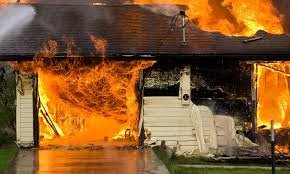In business, safeguarding assets from unforeseen risks is crucial to sustaining operations. One of the most destructive risks businesses face is fire, which can devastate physical assets, interrupt operations, and even lead to permanent closure. Commercial fire insurance plays a vital role in mitigating these threats by offering financial protection and support in the event of fire-related incidents. We will explore more about commercial fire insurance coverage, focusing on its importance, coverage specifics, types of policies, and what businesses need to consider when selecting suitable protection. By understanding the essentials of this insurance, businesses can make informed decisions that align with their needs, securing their operations and peace of mind.
The Importance of Commercial Fire Insurance for Businesses
Fire hazards represent a significant risk for any business that can lead to major financial losses, property damage, and extended operational downtime. Accidents cause fires and may also stem from electrical faults, equipment malfunctions, or natural disasters. The aftermath can result in costly repairs, replacements, and, in some cases, the complete reconstruction of facilities. Commercial fire insurance addresses these risks by providing coverage for damages caused directly by fire and related losses, such as smoke damage or water damage from fire suppression efforts. By investing in this insurance, businesses gain a safety net that helps them recover from incidents more swiftly and comprehensively. Furthermore, lenders or landlords often require this insurance as part of lease or loan agreements, highlighting its critical role in supporting business continuity. Without adequate fire insurance, companies face heightened exposure to financial instability, which can have long-term implications for their growth and sustainability.
Coverage Details: What Commercial Fire Insurance Typically Includes
Commercial fire insurance policies typically cover various damages associated with fire-related incidents. Primarily, this insurance covers the physical structure of the business property, including walls, roofs, and floors, which can be severely affected during a fire. In addition to the building, it often covers contents within the premises, such as equipment, inventory, and furnishings. This coverage extends to the costs of repairing or replacing damaged items, which is particularly beneficial for businesses that rely on expensive machinery or extensive stock inventories. Another essential component is business interruption coverage, which helps compensate for income lost due to operational downtime following a fire. This coverage can also assist with temporary relocation costs if the business needs to operate from a different location while repairs are underway. Additionally, some policies offer extended coverage for fire department service charges, debris removal, and expenses related to preventing further damage, such as boarding windows or hiring security to protect the site post-fire. While standard policies cover the basics, businesses may also have the option to add endorsements or riders to expand their protection, such as coverage for fires caused by natural disasters, which are often excluded from base policies.
Types of Commercial Fire Insurance Policies Available
Commercial fire insurance has different policy types, each catering to specific business needs and risk profiles. The most common types include Basic, Broad, and Special Form policies. A Basic Form policy provides fundamental coverage, insuring against a limited number of perils like fire, lightning, and explosions. This policy type suits businesses with lower risk levels or smaller budgets. As the name implies, the Broad Form policy extends coverage to additional perils, such as vandalism, water damage, and smoke damage. This type is more comprehensive than the Basic Form and benefits businesses in areas with a higher likelihood of specific hazards. Finally, the Special Form policy offers the most extensive coverage by insuring against all risks except those specifically excluded in the policy. This is ideal for businesses seeking comprehensive protection, although it typically comes at a higher cost.
Additionally, there are options for replacement cost coverage versus actual cash value coverage. Replacement cost policies cover the cost of replacing damaged property without considering depreciation, while actual cash value policies reimburse for the depreciated value of the items. Selecting the right policy type depends on the business’s unique circumstances, budget, risk exposure, and the level of protection needed.
Commercial fire insurance is a fundamental safeguard for businesses, providing essential financial support to recover from the devastating impacts of fire-related incidents. Business owners can make informed decisions that align with their risk profile and operational needs by understanding the different types of coverage, the specifics of policy options, and the factors to consider. Additionally, by incorporating proactive risk management practices, businesses can reduce their exposure to fire hazards and benefit from more favorable insurance terms. We have explored the critical elements of commercial fire insurance, equipping businesses with the knowledge to make strategic choices that enhance their resilience. With a well-chosen policy, companies can protect their assets, maintain stability, and ensure continuity in the face of unexpected fire-related challenges.

